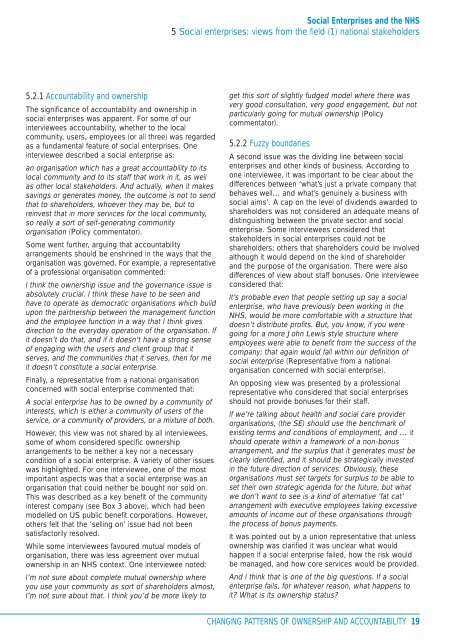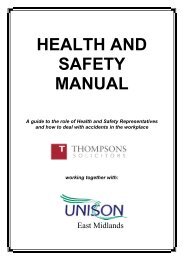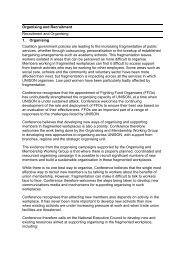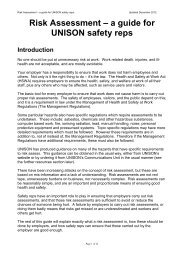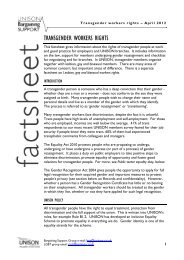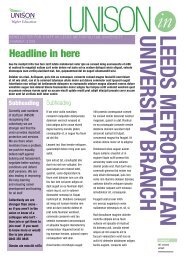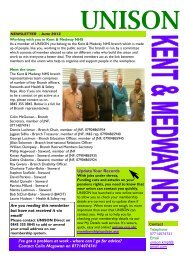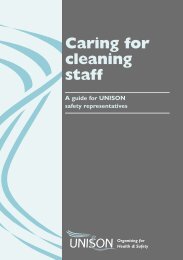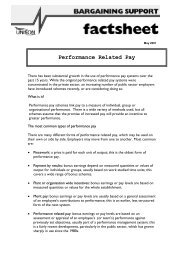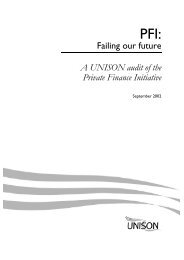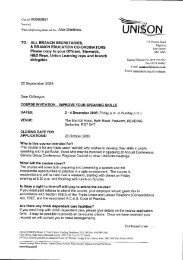Social Enterprises and the NHS - Unison
Social Enterprises and the NHS - Unison
Social Enterprises and the NHS - Unison
Create successful ePaper yourself
Turn your PDF publications into a flip-book with our unique Google optimized e-Paper software.
5.2.1 Accountability <strong>and</strong> ownership<br />
The significance of accountability <strong>and</strong> ownership in<br />
social enterprises was apparent. For some of our<br />
interviewees accountability, whe<strong>the</strong>r to <strong>the</strong> local<br />
community, users, employees (or all three) was regarded<br />
as a fundamental feature of social enterprises. One<br />
interviewee described a social enterprise as:<br />
an organisation which has a great accountability to its<br />
local community <strong>and</strong> to its staff that work in it, as well<br />
as o<strong>the</strong>r local stakeholders. And actually, when it makes<br />
savings or generates money, <strong>the</strong> outcome is not to send<br />
that to shareholders, whoever <strong>the</strong>y may be, but to<br />
reinvest that in more services for <strong>the</strong> local community,<br />
so really a sort of self-generating community<br />
organisation (Policy commentator).<br />
Some went fur<strong>the</strong>r, arguing that accountability<br />
arrangements should be enshrined in <strong>the</strong> ways that <strong>the</strong><br />
organisation was governed. For example, a representative<br />
of a professional organisation commented:<br />
I think <strong>the</strong> ownership issue <strong>and</strong> <strong>the</strong> governance issue is<br />
absolutely crucial. I think <strong>the</strong>se have to be seen <strong>and</strong><br />
have to operate as democratic organisations which build<br />
upon <strong>the</strong> partnership between <strong>the</strong> management function<br />
<strong>and</strong> <strong>the</strong> employee function in a way that I think gives<br />
direction to <strong>the</strong> everyday operation of <strong>the</strong> organisation. If<br />
it doesn’t do that, <strong>and</strong> if it doesn’t have a strong sense<br />
of engaging with <strong>the</strong> users <strong>and</strong> client group that it<br />
serves, <strong>and</strong> <strong>the</strong> communities that it serves, <strong>the</strong>n for me<br />
it doesn’t constitute a social enterprise.<br />
Finally, a representative from a national organisation<br />
concerned with social enterprise commented that:<br />
A social enterprise has to be owned by a community of<br />
interests, which is ei<strong>the</strong>r a community of users of <strong>the</strong><br />
service, or a community of providers, or a mixture of both.<br />
However, this view was not shared by all interviewees,<br />
some of whom considered specific ownership<br />
arrangements to be nei<strong>the</strong>r a key nor a necessary<br />
condition of a social enterprise. A variety of o<strong>the</strong>r issues<br />
was highlighted. For one interviewee, one of <strong>the</strong> most<br />
important aspects was that a social enterprise was an<br />
organisation that could nei<strong>the</strong>r be bought nor sold on.<br />
This was described as a key benefit of <strong>the</strong> community<br />
interest company (see Box 3 above), which had been<br />
modelled on US public benefit corporations. However,<br />
o<strong>the</strong>rs felt that <strong>the</strong> ‘selling on’ issue had not been<br />
satisfactorily resolved.<br />
While some interviewees favoured mutual models of<br />
organisation, <strong>the</strong>re was less agreement over mutual<br />
ownership in an <strong>NHS</strong> context. One interviewee noted:<br />
I’m not sure about complete mutual ownership where<br />
you use your community as sort of shareholders almost,<br />
I’m not sure about that. I think you’d be more likely to<br />
<strong>Social</strong> <strong>Enterprises</strong> <strong>and</strong> <strong>the</strong> <strong>NHS</strong><br />
5 <strong>Social</strong> enterprises: views from <strong>the</strong> field (1) national stakeholders<br />
get this sort of slightly fudged model where <strong>the</strong>re was<br />
very good consultation, very good engagement, but not<br />
particularly going for mutual ownership (Policy<br />
commentator).<br />
5.2.2 Fuzzy boundaries<br />
A second issue was <strong>the</strong> dividing line between social<br />
enterprises <strong>and</strong> o<strong>the</strong>r kinds of business. According to<br />
one interviewee, it was important to be clear about <strong>the</strong><br />
differences between ‘what’s just a private company that<br />
behaves well… <strong>and</strong> what’s genuinely a business with<br />
social aims’. A cap on <strong>the</strong> level of dividends awarded to<br />
shareholders was not considered an adequate means of<br />
distinguishing between <strong>the</strong> private sector <strong>and</strong> social<br />
enterprise. Some interviewees considered that<br />
stakeholders in social enterprises could not be<br />
shareholders; o<strong>the</strong>rs that shareholders could be involved<br />
although it would depend on <strong>the</strong> kind of shareholder<br />
<strong>and</strong> <strong>the</strong> purpose of <strong>the</strong> organisation. There were also<br />
differences of view about staff bonuses. One interviewee<br />
considered that:<br />
It’s probable even that people setting up say a social<br />
enterprise, who have previously been working in <strong>the</strong><br />
<strong>NHS</strong>, would be more comfortable with a structure that<br />
doesn’t distribute profits. But, you know, if you were<br />
going for a more John Lewis style structure where<br />
employees were able to benefit from <strong>the</strong> success of <strong>the</strong><br />
company; that again would fall within our definition of<br />
social enterprise (Representative from a national<br />
organisation concerned with social enterprise).<br />
An opposing view was presented by a professional<br />
representative who considered that social enterprises<br />
should not provide bonuses for <strong>the</strong>ir staff.<br />
If we’re talking about health <strong>and</strong> social care provider<br />
organisations, (<strong>the</strong> SE) should use <strong>the</strong> benchmark of<br />
existing terms <strong>and</strong> conditions of employment, <strong>and</strong> … it<br />
should operate within a framework of a non-bonus<br />
arrangement, <strong>and</strong> <strong>the</strong> surplus that it generates must be<br />
clearly identified, <strong>and</strong> it should be strategically invested<br />
in <strong>the</strong> future direction of services. Obviously, <strong>the</strong>se<br />
organisations must set targets for surplus to be able to<br />
set <strong>the</strong>ir own strategic agenda for <strong>the</strong> future, but what<br />
we don’t want to see is a kind of alternative ‘fat cat’<br />
arrangement with executive employees taking excessive<br />
amounts of income out of <strong>the</strong>se organisations through<br />
<strong>the</strong> process of bonus payments.<br />
It was pointed out by a union representative that unless<br />
ownership was clarified it was unclear what would<br />
happen if a social enterprise failed, how <strong>the</strong> risk would<br />
be managed, <strong>and</strong> how core services would be provided.<br />
And I think that is one of <strong>the</strong> big questions. If a social<br />
enterprise fails, for whatever reason, what happens to<br />
it? What is its ownership status?<br />
CHANGING PATTERNS OF OWNERSHIP AND ACCOUNTABILITY 19


